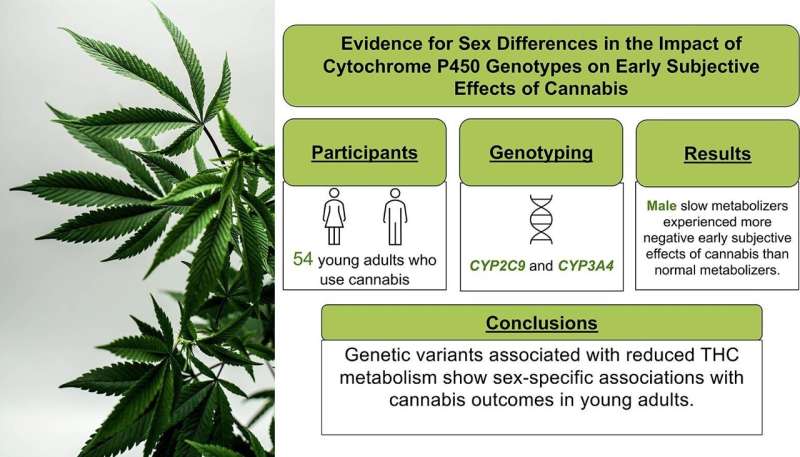This article has been reviewed according to Science X's editorial process and policies. Editors have highlighted the following attributes while ensuring the content's credibility:
fact-checked
trusted source
proofread
A genetic difference in THC metabolism may explain why some young adults have negative experiences with cannabis

Differences in how young adults metabolize THC, the main part of cannabis that makes people feel "high," can influence how they feel after taking the drug as well as their potential risk for developing cannabis use disorder, or CUD.
These findings were recently published in Addictive Behaviors by MUSC researcher Rachel Tomko, Ph.D., and former psychology intern Christal Davis, Ph.D., who is now a postdoctoral fellow at the University of Pennsylvania, as well as other MUSC colleagues and collaborators at the University of Florida and the University of Colorado. Tomko and Davis also explored whether the effects of a genetic difference in THC metabolism on future outcomes of cannabis use depend on a person's sex.
CUD, which affects one in five people who use cannabis, leads to problems such as withdrawal symptoms and cravings when not using cannabis, difficulty reducing cannabis use, and a need to consume more of the drug to experience the same effects.
THC metabolism, the process by which this active component gets broken down in your body into psychoactive and inactive components, can be influenced by genetic differences in enzymes. About one in four people have a gene that causes these enzymes to break down THC less effectively than others, which can increase the strength and duration of the effects of cannabis.
Differences in metabolism have been linked to an increased risk for substance use disorder for other drugs but not yet cannabis.
"Unfortunately, we're just beginning to understand some of the effects of how people metabolize and process cannabis," explained Davis.
For their study, the researchers recruited 38 young adults ages 18-25 with CUD and 16 with a non-CUD substance use disorder. This age group was chosen as they are three times more likely to have CUD than teens or adults over 26 who use cannabis. "This age group is super important to study because the brain is still developing up through young adulthood," said Tomko. "So, this is a key time for intervention."
Blood samples were collected from study participants, and gene variants for THC-metabolizing enzymes were tested. Participants also completed a questionnaire designed to measure their reported positive and negative effects of cannabis use. Based on their gene variant, participants were categorized as either normal or slow THC metabolizers. The researchers then correlated metabolism with the subjective effects reported by the participants.
Davis was surprised by the sex differences evident in the data.
"Looking at our data, we realized very quickly that there were sex-specific effects going on that we couldn't ignore."
Notably, the study showed that young females with CUD were more likely to be slow metabolizers of THC compared to young females with other (non-CUD) substance use disorders. This suggests that young females who metabolize cannabis more slowly may be at higher risk for developing CUD.
When looking at young adult males, the researchers found that those who had a gene variant contributing to slower THC metabolism reported more negative effects during initial cannabis use, like drowsiness, laziness, and difficulty concentrating. Overall, participants of both sexes who were categorized as slow metabolizers of THC experienced more negative effects during recent cannabis use.
Although the study recruited young adults, the most important implications of its findings may be for teens. Many young adults who develop CUD start using cannabis in their teens. As the social acceptance of cannabis grows and its perceived risk diminishes, teens may use cannabis more if they are not aware of potential harm.
The study highlights that not all young people who use cannabis experience the drug the same way and that how people metabolize THC may be one factor that could contribute to the risk for CUD. Although slower THC metabolizers experience more negative effects, the experience of simultaneous positive effects may lead them to continue cannabis use regardless of bad outcomes.
"We might think that if you're experiencing negative effects, you don't continue to use, but in the face of positive, rewarding effects, maybe you do," said Tomko.
Tomko and Davis believe it is important to educate teens about the differences in how people experience cannabis. For example, educational programs targeted to adolescents can improve their understanding of risk factors for CUD. The Just Say "Know" program, led by Lindsay Squeglia, Ph.D., at MUSC, offers presentations and hands-on training to teach middle and high school students about the neuroscience of drug addiction.
Since most people don't get genetic testing for these potential risk factors, it's important to understand how these findings can better inform treatment options for people struggling with CUD.
"Our study opens up new hypotheses and options to explore medications that might modify THC metabolism as a potential treatment for cannabis use disorder," suggested Tomko.
The initial findings from this research may be particularly important in the context of the continual rise in cannabis potency that has been observed over the past couple of decades, as well as the availability of high-potency cannabis products in legal markets.
"The increases in THC levels found in cannabis could mimic some of the more pronounced effects that we see for people who are slower metabolizers," said Davis. "The effects of cannabis are lasting longer because it's stronger THC."
With a lack of regulation of cannabis products, combined with an increase in acceptance of cannabis use, additional research to identify risk factors for CUD will be necessary to advise vulnerable groups, like adolescents.
The work is published in the journal Addictive Behaviors.
More information: Christal N. Davis et al, Evidence for sex differences in the impact of cytochrome P450 genotypes on early subjective effects of cannabis, Addictive Behaviors (2024). DOI: 10.1016/j.addbeh.2024.107996




















